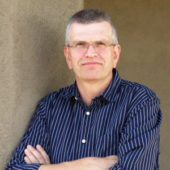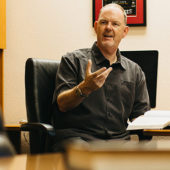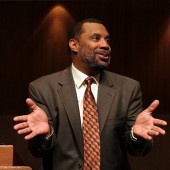I’m reading through the Bible this year and have pressed pause at the passages where God asks someone a question. In Genesis, God asked Adam and Eve after they had eaten the forbidden fruit, “Where are you?” (Genesis 3:9).
God did not ask Adam and Eve this question because he didn’t know where they were. He knew exactly where they were: hiding out in the bushes, naked, ashamed, and afraid. He asked them the question so that they would know where they were. Adam and Eve weren’t only hiding from God, they were hiding from themselves.
Self-awareness is an essential skill we must learn if we want to grow, change, and have a good relationship with God as well as others. The folly of fools is deceit – including the deceit of one’s own self. The prophet Jeremiah says that our heart is deceitful above all else and desperately wicked (Jeremiah 17:9). We can’t even know our own heart entirely apart from God and other people’s help.
The writer of Proverbs tells us that “the wisdom of the prudent is to understand his ways” (Proverbs 14:8).
Here are two additional ways we can learn to be more self-aware so that when God (or anyone else) asks us where we are, we know and have an answer.
Self-Reflection
“Give careful thought to your ways” Haggai 1:7
There are many individuals who come up blank when asked the question “What are you feeling?” or “What do you think about that?” or “What do you really want in life?” Simple questions such as, “What are your strengths and weaknesses?” often cause someone to feel anxious because they really don’t know their own selves very well.
It takes time to reflect about who you are, what you think, how you feel and what you want. Some people think those questions are self-indulgent and self-centered. However, it’s important that we understand that we can’t let anyone else know who we are or where we are unless we ourselves first know. Selfishness isn’t characterized by knowing how you feel or what you want, selfishness is when you demand that other people always cater to your feelings, your wants, and your needs.
To grow in self-reflection, ask yourself “what” questions. Don’t just swallow what everyone tells you, but ask yourself what you think about a certain topic or current event. When something painful happens, ask yourself what feelings are coming up inside. Are you scared? Sad? Angry? Shamed? Do you know how to tell the difference? Men tend to have a more difficult time identifying their feelings or even admitting to having them, but it’s a crucial skill if we are going to have an intimate relationship with someone and good emotional and spiritual health.
Journaling is a good way to reflect upon your day’s experiences. Don’t just write what happened, but write about how you thought about what happened and what you felt and even what you wanted. That will give you good practice in getting to know yourself.
Self examination
Plato said a life unexamined is not worth living. The word examine means to study or scrutinize something more closely. The apostle Paul tells us to examine ourselves before partaking in communion so that we will not be careless or reckless with this most sacred sacrament (1 Corinthians 11:28). Most of our self-examine questions begin with “why” such as when the psalmist asked himself, “Why are you cast down, O my soul, and why are you in turmoil within me?” (Psalm 42:5)
Once you become aware, for example, that you have a certain feeling, ask yourself why is it here? What purpose does it serve?
Our emotions are meant to inform us, not rule us. Our emotions always serve a purpose like the warning lights on a car dashboard. Ignoring them doesn’t make them go away and often ignoring our feelings only makes the problem worse. For example, if we refuse to admit to ourselves that we’re angry or depressed, jealous, or sad, shamed or excited, then we can’t take the next step of deciding what (if anything) we want to do about those emotions.
Recently one of my coaching clients became aware of some inappropriate feelings that she was experiencing toward a professional colleague. Once she admitted her feelings to herself, she asked herself why they were there. As she reflected and examined what was going on, she recognized she was vulnerable and her marriage needed some CPR. This awareness not only helped her to guard her own heart against sinful acting out, it helped her turn her attention toward working more intentionally on strengthening her marriage.
“Why” questions that help you get to know yourself better might be, “Why do I feel this particular emotion right now?” or “Why is that so important to me that I’m willing to fight with my co-workers or spouse in order to get it?” or “Why am I acting this way right now?” (Whether it be angry, shy, controlling, rude, impatient, etc.)
Let me close with a ditty Daniel Goleman wrote in his book, Vital Lies, Simple Truths.
The range of what we think and do
is limited by what we fail to notice.And because we fail to notice that we fail to notice
there is little we can do to change.Until we notice how our failing to notice
shapes our thoughts and deeds.
If you need help in becoming more reflective or more aware and need someone in your life to ask you the right questions, you may want to consider working with a coach to help you grow to the next step.






















